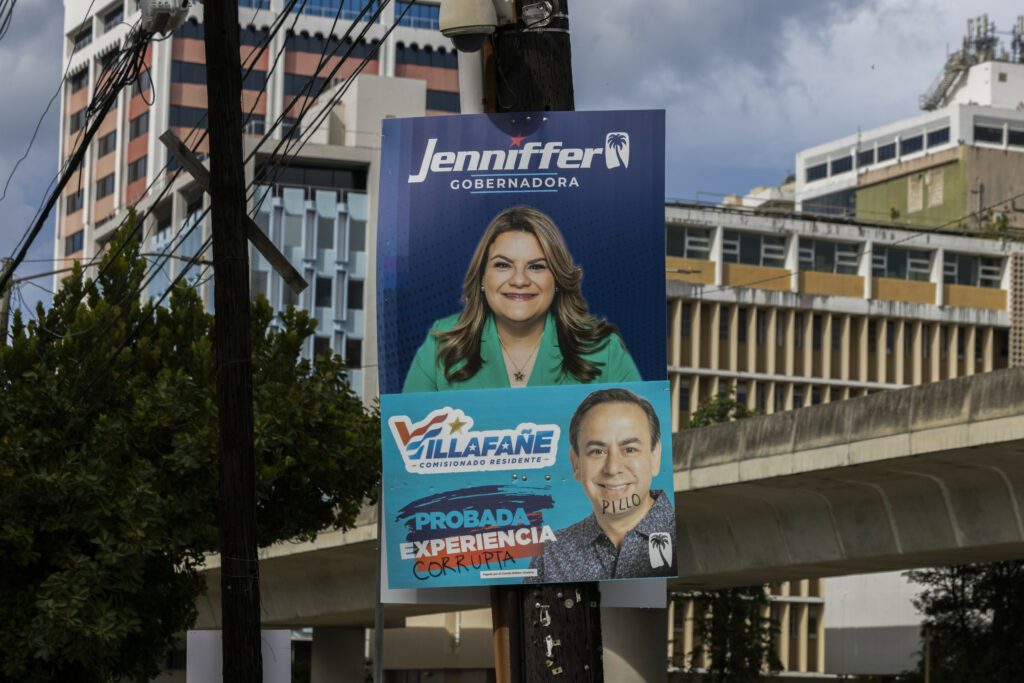Puerto Rico is holding a pivotal election on Tuesday that could reshape the island’s political landscape, regardless of which of the two leading candidates emerges victorious.
With a new challenger and the promise of unprecedented outcomes, this year’s race has captured the attention of voters and analysts alike, offering a glimpse into the changing dynamics of the island’s politics.
At the forefront of the race is Jenniffer González, the candidate from the pro-statehood New Progressive Party (NPP).
If González wins, it would mark a historic third consecutive term for the party, solidifying its influence and potentially strengthening Puerto Rico’s push to become the 51st state of America.
A campaign poster promotes New Progressive Party gubernatorial candidate and Puerto Rico’s representative in Congress Jenniffer González, above a campaign poster of resident commissioner candidate Luis Villafañe, defaced with the Spanish words for corrupt and…
A campaign poster promotes New Progressive Party gubernatorial candidate and Puerto Rico’s representative in Congress Jenniffer González, above a campaign poster of resident commissioner candidate Luis Villafañe, defaced with the Spanish words for corrupt and rogue, in San Juan, Puerto Rico, Nov. 2, 2024. If González wins, it would mark a historic third consecutive term for the party, solidifying its influence and potentially strengthening Puerto Rico’s push to become the 51st state of America.
More
Alejandro Granadillo/AP
Ballot Features Puerto Rican Status, Symbolic U.S. Presidential Vote
Puerto Ricans are being asked their opinion on the island’s political status for the seventh time. The nonbinding referendum offers voters three options: statehood, independence, or independence with free association, which would allow Puerto Rico to negotiate matters such as foreign affairs, U.S. citizenship, and use of the U.S. dollar with the U.S. government.
However, any change in Puerto Rico’s status requires U.S. Congressional approval, making this vote largely symbolic for now.
Voters are also being offered the opportunity to participate in a symbolic presidential vote. While Puerto Ricans are U.S. citizens, they are not permitted to vote in U.S. presidential elections, but the symbolic ballot allows them to show support for either Kamala Harris or Donald Trump, despite the fact that their votes won’t count toward the actual U.S. presidential election.
Nearly two million voters are eligible to participate in the election, but voter apathy has been a persistent issue in recent years, with many residents disillusioned by the slow pace of change and the ongoing struggles with economic inequality and political corruption.
Who Are The Candidates in the Puerto Rico Elections?
On the other side is Juan Dalmau, representing the Independence Party and the Citizen Victory Movement, whose victory would make history as the first win by a candidate outside of the two major parties that have long dominated Puerto Rican politics.
Trailing behind González and Dalmau in the polls is Jesús Manuel Ortiz of the Popular Democratic Party (PDP), which advocates for maintaining Puerto Rico’s territorial status.
Rounding out the field is Javier Jiménez of Project Dignity, a conservative party formed just five years ago that has also begun to attract more attention in recent elections.
For decades, the New Progressive Party and the Popular Democratic Party held an iron grip on the island’s electoral system, with the two parties typically capturing over 90 percent of the vote.
However, the political tide has shifted since 2016, as younger and more diverse parties—reflecting growing discontent with the traditional political establishment—have gained traction in the wake of economic challenges and political instability.
A billboard promoting Puerto Rico’s Independence Party and the Citizen Victory Movement gubernatorial candidate Juan Dalmau towers over a highway, in San Juan, Puerto Rico, Saturday, Nov. 2, 2024. For decades, the New Progressive Party…
A billboard promoting Puerto Rico’s Independence Party and the Citizen Victory Movement gubernatorial candidate Juan Dalmau towers over a highway, in San Juan, Puerto Rico, Saturday, Nov. 2, 2024. For decades, the New Progressive Party and the Popular Democratic Party held an iron grip on the island’s electoral system.
More
Alejandro Granadillo/AP
2024 Election Results Expected to be Delayed
“There has been a major shift in Puerto Rican politics,” said Jorge Schmidt Nieto, a political analyst and professor. “The dominance of the New Progressive Party and the Popular Democratic Party is being challenged in ways we haven’t seen in decades.”
Despite heavy rain and flash flood warnings in San Juan and other parts of the island over recent days, voter turnout remained steady.
Polls opened midmorning, and early reports indicated that hundreds were already waiting in line.
However, the results of the election are expected to be delayed, with experts predicting that it could take several days before the full tally is announced.
In the 2020 election, it took Puerto Rico’s State Elections Commission four days to release preliminary results, and analysts expect similar delays this time.
On Monday, the commission was still processing more than 220,000 early and absentee ballots, a count that has been delayed due to logistic issues.
Jessika Padilla said around 40 percent of the early votes had been counted by the start of the week.
“This validation process is one that we are not going to take lightly,” she said, stressing the importance of accuracy in the count.
Are Elections in Puerto Rico Straightforward?
Over 5,000 prison inmates—out of about 7,400 incarcerated individuals—have also cast their votes, though it remains unclear how many of those ballots have been processed.
In addition, multiple parties have raised concerns about irregularities, including allegations that some voters received early voting confirmations they never requested.
The State Elections Commission has also deployed backup generators to over two dozen polling stations to ensure the process continues smoothly amid Puerto Rico’s ongoing power grid issues, which have plagued the island for years.
The upcoming election could test whether the rising influence of smaller parties will drive greater turnout, or if the traditional two-party dominance will persist.
This article contains additional reporting from The Associated Press
Source link : http://www.bing.com/news/apiclick.aspx?ref=FexRss&aid=&tid=672a52d8ac924331b19c088a69b521a3&url=https%3A%2F%2Fwww.newsweek.com%2Fpuerto-rico-election-day-ends-gonzalez-dalmau-ortiz-1980513&c=4920184372575270198&mkt=en-us
Author :
Publish date : 2024-11-05 03:03:00
Copyright for syndicated content belongs to the linked Source.
